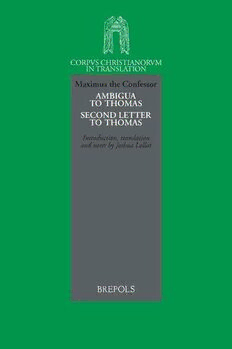
Maximus the Confessor, Ambigua to Thomas and Second Letter to Thomas (Corpus Christianorum in Translation) PDF
144 Pages·2010·0.948 MB·English
Most books are stored in the elastic cloud where traffic is expensive. For this reason, we have a limit on daily download.
Preview Maximus the Confessor, Ambigua to Thomas and Second Letter to Thomas (Corpus Christianorum in Translation)
Description:
Maximus the Confessor, a monk and theologian of the seventh century, was a transmitter and creative interpreter of the dogmatic and ascetical traditions of the Greek-speaking Church, and an innovative mind in his own right. An important figure on the theological landscape of his day, he became deeply involved in the post-Chalcedonian Christological controversies concerning the natures, activities (energies), and wills in Christ, eventually suffering at the hands of the imperial authorities for his rejection of certain imperial dogmatic decrees, which in his view denied the principle of the salvation of the cosmos: the perfect communion of divinity and humanity as preserved in their own proper natures in the one Christ. He died in exile on the Black Sea coast, soon after his trial in Constantinople, in 662. The Ambigua to Thomas are a collection of chapters devoted to the exposition of passages from Gregory Nazianzen and Ps. Denys the Areopagite. Maximus uses the texts as a means of expounding the meaning of the perfect union of divinity and humanity in the one Christ, arriving ultimately at an interpretation of the phrase from Denys, which affirmed that Christ conducted his life among us according to a certain new theandric activity. The source text of this volume appeared in Corpus Christianorum Series Graeca as Maximus Confessor - Ambigua ad Thomam una cum epistula secunda ad eundem (CCSG 48). References to the corresponding pages of the Corpus Christianorum edition are provided in the margins of this translation.
See more
The list of books you might like
Most books are stored in the elastic cloud where traffic is expensive. For this reason, we have a limit on daily download.
